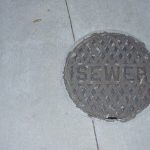A sewer line problem can be a nightmare scenario for any homeowner. It doesn’t matter if you have a clog in the line, sewage backing up or a broken sewer line, these are all jobs for a professional plumber. The process of getting your sewer line problem fixed starts with contacting a local plumbing contractor and asking for a sewer service estimate. But what happens next? This article will show you what to expect during the sewer estimate process.
The Sewer Service Estimate
When you contact a local certified plumber for a sewer service quote, it’s likely that they will ask you some pertinent questions. This will help the plumber to get a general idea about the types of problems that you’re experiencing. The four most likely initial questions. Include:
- Are there plumbing fixtures located on a lower level, such as a bathroom, laundry basin, or a floor drain? If so, are these plumbing fixtures clogged?
- Is there are a sewage backup and does it get worse when other plumbing fixtures are running?
- If there is a backup, does it have a sewage smell or foul odor?
- Has this type of plumbing problem happened before? If so, how long ago did this happen and what happened?
From the information that you provide the plumber will make an evaluation. If they suspect that you have a main drain clog, they may schedule an emergency service and send out a plumber to make an evaluation.
An At Home Sewer Estimate
The next stage of the sewer estimate will take place at your home. The plumber will carry out an inspection of your sewer line using a fiber optic camera. This will help them to establish the location of the sewer line and evaluate any damage that’s been caused. Most plumbers will then follow four key steps to move the estimate process forward; they are:
Step 1: An Explanation
The first thing that your plumber will do is explain the results of the camera inspection. The plumber will use their experience and knowledge to interpret their findings to tell you what the sewer line problem is. This will help you to make a more informed decision as the process moves forward.
Step 2: The Available Options
Depending on the location and severity of the sewer line problem, there may be different repair options available. The main consideration for most homeowners is the viability of a trenchless repair. This involved far less disruption with a minimal amount of digging. Each sewer line repair option will be explained to make sure you understand them all, and the plumber is likely to give their opinion on which would be the best method to fix the problem quickly.
Step 3: Accurate Pricing
A good plumber will then provide an accurate price for each sewer line repair option they have mentioned. If the inspection was thorough, this should be easy for a plumbing professional, so be wary of plumbers that seem vague. That being said, there are unknown variables that can be an unforeseen factor, such as a depth that goes beyond a collapsed pipe. But, these are rare situations, and they will be fully explained before any work commences.
Step 4: Gathering Information
The plumber will then need to gather all the information that they will need to provide a high quality sewer line service. This will allow the plumbing contractor to make a plan to carry out a sewer line repair or replacement efficiently. This will include scheduling, times, and other details that will make the process go as smoothly as possible.
A thorough at home sewer estimate should take between 1-3 hours, depending on the complexity of your homes sewer system.
9 Questions to Ask During a Sewer Estimate
Like any industry, there are good and bad plumbers, and you need to be confident in the company that you choose to work on your sewer line. The last thing that you need is a plumbing contractor that carries out poor quality work and cannot turn up on time. Let’s look at nine questions to ask the plumber during the sewer estimate.
- Will the plumber used at your home be licensed?
- Will subcontractors be used and will they have background checks?
- Is your plumbing company OSHA certified?
- Do you have adequate levels of insurance?
- Do you provide a warranty?
- How many sewer repairs does your company perform per month?
- Will there be a price increase after you start the job?
- Will there be a thorough camera inspection to verify the location of the sewer line and the scope of the sewer line repair or replacement?
- Do you have a license and can you pull a permit?
Asking these questions should help you to evaluate the professionalism of the plumber before they carry out any work in your home and on your property. But, you can prepare the way for these types of problems by carrying out some research of your own on professional local plumbing companies.
Finding a Good Local Plumbing Company
A plumbing system is complex, most of the time it works well, but things can go wrong, and when you’re dealing with water, the results can be catastrophic for your home. A plumbing problem can lead to a wide variety of issues, such as water leaks, water damage, sewage backup, a loss of water pressure, mold growth, and many others. But, when a plumbing issue occurs, many homeowners reach for the phone and hire the first person that picks at the other end. Hiring someone to do a job when you’re desperate and you have an emergency plumbing problem is not advisable.
It’s a better idea to do some research before you need a
local plumber and then you know the number to call if you have a problem. Ask your friends and family about plumbers they have used to get a personal recommendation and check online reviews for your area. Once you have found a good local licensed plumber ask them about a plumbing service to evaluate the health of your plumbing system.
By Giovanni Longo President Flood Brothers Plumbing
Giovanni Longo is a 3rd generation master plumber who has been practicing his craft and trade in the greater Los Angeles area for well over a decade and a half. A plumbing and hydraulics-engineering innovator, Giovanni’s particular world-class expertise focuses on dealing with challenging sewer system designs as well as resolving complex commercial and residential draining issues. As a certified Flood Mitigation expert, he is also well versed in a wide variety of water damage and remediation solution.





